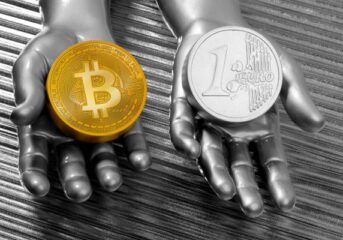10 Essential Factors for Choosing the Best Cryptocurrency Exchange
A cryptocurrency exchange is a crypto user’s on-ramp to their crypto experience. It’s essential to trading, using dApps, and even making crypto payments. However, crypto users should choose a safe and reputable exchange that meets their needs.
There have been billions in crypto lost to exchange hacks and failures over the last decade, so there’s lots to consider when choosing the best cryptocurrency exchange.
Understanding Cryptocurrency Exchanges
What is a Crypto Exchange?
A cryptocurrency exchange is a platform for buying, selling, and trading cryptocurrencies. An exchange lets users trade fiat funds for crypto or one type of crypto for another, though only some exchanges accept fiat currency.
Centralized exchanges (CEX) are controlled centrally, usually by a company, and decentralized exchanges (DEX), run more autonomously by blockchain-based smart contracts. For the most part, this article will focus on centralized cryptocurrency exchanges, which are most used by investors and traders.
Why Choosing the Right Exchange Matters
Every exchange is different. Some have more basic or user-friendly functionality and are great for beginners in crypto. Others are more advanced and offer complex dashboards, other investment products, crypto staking, and the ability to invest in token pre-sales. The cryptocurrency and fiat pairs available for trading will also vary on each exchange.
Crypto users should choose an exchange with the functionality and cryptocurrencies they want to access. But it is also essential to select a regulated, safe, and reputable exchange with good customer support if a problem occurs.
Thorough research for each essential factor when choosing a cryptocurrency exchange helps to identify a reputable exchange and lets crypto users protect their funds to the best of their ability.

Factors to Examine When Choosing the Right Crypto Exchange
1. Assess Security Measures
The first step to assessing a cryptocurrency exchange is to research its security and reliability. Users must look for robust security measures such as two-factor authentication (2FA), the cold storage of funds, excellent encryption protocols, and evidence of regular security audits.
It’s wise to check an exchange’s history, particularly for security breaches and how they were overcome. User reviews and community feedback, even crypto news stories, will also shed light on security and issues.
Importance of Security Protocols
Strong crypto exchange security protocols are essential. Hackers frequently target exchanges, and billions in investor funds have been lost. Hacks happen and will continue to as attackers target anything from smart contract vulnerabilities to private key weaknesses. Due diligence by investors is crucial.
2. Investigate Regulatory Compliance
Checking how and where an exchange is regulated will show its compliance with standards. Even if cryptocurrencies aren’t consistently regulated worldwide, the best exchanges have sought oversight and regulation, and some adhere to institutional-level standards to demonstrate credibility and attract more users.
3. Evaluate Fee Structures
An exchange will charge fees for its services. They can apply to deposits, withdrawals, and trading transactions. The best exchanges will have transparent fees and tiers based on trading volume with incentives for frequent traders.
4. Check Liquidity Levels
Liquidity on an exchange refers to how quickly and at what price an exchange can serve user orders. Higher liquidity makes transactions faster and smoother and limits the risk of slippage.
5. Consider Ease of Use
A well-designed, easy-to-navigate user interface is critical for the best experience on an exchange. Platforms that serve day traders and experienced investors may have complex dashboards. Investors new to crypto might look for something simpler.
6. Review Supported Cryptocurrencies
As mentioned, the cryptocurrencies listed on each exchange will be very different. Some exchanges offer just tens of crypto options, while others list hundreds. Investors looking to buy or trade a particular crypto or trading pair will check an exchange’s listings before signing up for an account.
7. Research Exchange Reputation
A cryptocurrency exchange’s reputation will generally reveal most things, good or bad, that a new customer wants to know. Reviews can be found online and on social media, but looking out for genuine ones is important.
8. Verify Customer Support Quality
Whilst reading exchange customer reviews and recommendations, it’s normally possible to get a good idea of what actual customer support is available. Exchanges should say whether they offer in-person telephone or chat-based support, and reviews will reveal how other customers found their experience.
9. Analyze Withdrawal and Deposit Processes
Savvy investors will look closely at withdrawal and deposit processes, including the time taken, any restrictions and fees, and what happens if there’s a problem like an error in a transaction or even an issue with liquidity on the exchange. New crypto users need to remember that often, if there’s an error, problem, or hack, there’s no protection, and funds are frequently lost in the nascent and generally unregulated space.
10. Explore Additional Features
Serious crypto fans might look for additional exchange features. These can include spot, futures, margin trading, cryptocurrency staking and lending products, or the ability to invest in new crypto pre-sale projects.
Crypto exchanges that could be more suitable for beginners
Beginners buying and selling cryptocurrencies will likely look for larger, established exchanges with extensive features and an easy-to-use interface. Some exchanges have demo accounts for beginners to get used to platform features and how to buy and sell crypto before risky real funds. Some exchanges offer customized or simplified dashboards for new users and more complex interfaces for experienced traders.
At the time of writing, the three largest cryptocurrency exchanges in the world, by the volume of crypto they transact, are Binance, ByBit, and Coinbase. Though each of these exchanges has seen scrutiny, been hacked, or been under the eye of regulators, they, along with others, remain the most highly ranked by crypto news and websites.
Crypto exchanges that could be more suitable for experienced investors
Generally, the best cryptocurrency exchanges for beginners also offer advanced features for experienced investors and have competitive fees and incentives for regular users. Both Binance and Coinbase cater to both beginner and expert cryptocurrency users.
Binance, for example, offers spot and futures trading, margin trading, and staking and has the Binance Launchpad for new crypto and token projects. Coinbase offers Coinbase Advanced for experienced investors, which has enhanced tools like charts provided by Trading View, more complex order types, and other features like crypto staking.
Conclusion
Choosing the best cryptocurrency exchange can sometimes feel overwhelming for investors because of the risks associated with cryptocurrencies and the frequent problems and hacks related to exchanges.
Good research based on the points mentioned in this Coin Hint guide can make finding a new or a first exchange much easier. Crypto users and investors should always know the risks and their risk tolerance.
FAQ
-
What is the safest crypto exchange?
Crypto users and investors can choose the safest crypto exchange based on their research on its security, reputation, history, and regulatory compliance.
-
How do I know if a crypto exchange is reliable?
Genuine customer reviews found online and on social media and reading news stories relevant
to an exchange can often identify if an exchange is reliable and reputable. There are also ranking sites for exchanges. -
Can I trust exchanges with low fees?
Fees are just one aspect to consider when choosing the best cryptocurrency exchange. It’s also vital to look at an exchange’s history, security, regulatory oversight, customer service, usability, liquidity, and processes.
-
Should I use multiple crypto exchanges?
Experience cryptocurrency users and investors may use multiple cryptocurrency exchanges to find the trading pairs or additional products and services they need. It’s most important to carefully assess an exchange before signing up for a new account.







